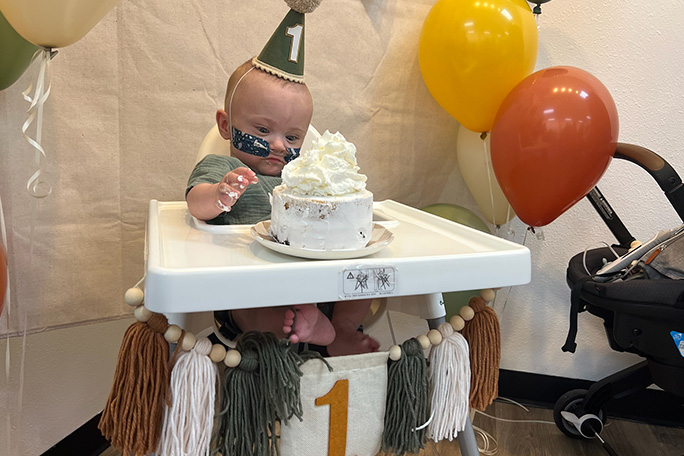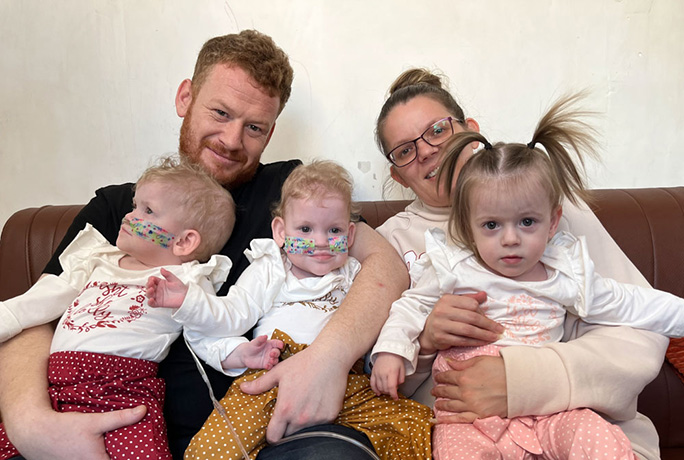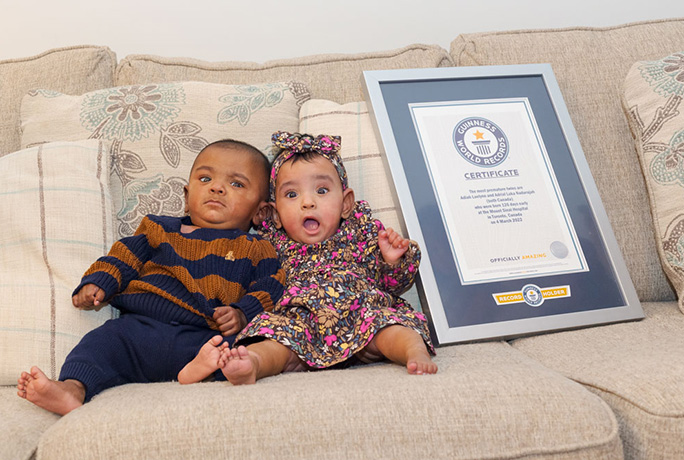Amazing births: the incredible stories of the most premature babies

Childbirth may be one of the most ancient acts on Earth, but it never ceases to amaze and fascinate.
At Guinness World Records, we often encounter stories that showcase just how awe-inspiring the start of a life can be.
That is why, on the occasion of World Prematurity Day 2025, we want to shine a spotlight on the amazing stories of parents and infants who defied all odds with courage, grit, and a good measure of wonder.
First established in 2008 and added this year as an official date of the World Health Organization (WHO), the day highlights the reality of preterm births: a reality that, as per 2020 data, impacts one in 10 babies worldwide.
But what is a preterm birth?
With the average gestational period being around 42 weeks, the term refers to babies born alive before 37 weeks of pregnancy are completed.
Subcategorised according to the gestational age, a preterm birth can be: "extremely preterm" (less than 28 weeks), "very preterm" (28 to less than 32 weeks) or "moderate to late preterm" (32 to 37 weeks).
A baby can be born premature for many different reasons, but one thing is certain: an early start in life can seriously threaten the baby's survival.
Even after the first critical hours, a preterm birth can have dramatic consequences for the baby's health and development, even more so in countries and economic backgrounds lacking the proper medical care.
Therefore, through the annual World Prematurity Day, the WHO campaigns for the rights of these small but brave soldiers and their families, voicing the urgent need for better care and stronger support systems.
To mark the occasion, we have dived into the Guinness World Records archives to compile a lineup of remarkable, record-breaking births.
The most premature baby
Nash Keen – affectionately dubbed “Nash Potato” by parents Mollie and Randall – is “determined, curious and the happiest baby you’ll meet”.
He is also a record-breaking survivor and the most premature baby ever.
Born in July 2024, 133 days premature, baby Nash recently celebrated his first birthday surrounded by the love of his family.
However, this tiny but mighty fighter defied phenomenal odds to reach this milestone.
Nash was delivered by the medical team at the cutting-edge University of Iowa Health Care, located in Iowa City, at the striking gestational age of 21 weeks.
At the UI Health Care, Mollie Keen and her newborn son were attended by the hospital's staff and neonatologist Dr Amy Stanford, who supervised Nash’s resuscitation.
Surrounded by cables and lighter than a grapefruit, Baby Nash fought hard in those first critical hours: he was immediately transported to the Level IV NICU (the neonatal intensive care unit), where he stayed for the following six months as he made tiny but steady progress.

Looking back, proud and grateful as they celebrate their baby's first birthday, the Keens express their immense appreciation to those who supported Nash in his first year.
A special thanks went, understandably, to the hospital team: "You turned a scary, sterile space into something that felt like home. You were more than medical staff," said Mollie.
"You became our people, our family."
He's come so far, and this milestone isn’t just about turning one, it’s about resilience, hope and everything he’s overcome to get here - Nash's Mom, Mollie
"The attention has always come from a place of love and support, and for that, we’re incredibly grateful," Mollie added.
Supported by the doctor and the many people who cheer for him, Nash continues to have regular check-ups to monitor his health and development.
“It’s emotional in so many ways: pride, gratitude, even some grief for how different his journey has been. But above all, it feels like a victory,” the parents admitted.
The Keens also understood the importance of sharing Nash's record-breaking story, and hope that their experience can empower and help other families facing similar challenges: "We wanted to give hope to other families walking hard medical roads and to show what’s possible even in the most uncertain circumstances," they say.
“Nash isn’t just a record breaker – he’s a heart-stealer,” Mollie said.
"From the very beginning, our family and friends rallied behind him, and as his story spread, so did the love."
The most premature twins
Canada’s Adiah Laelynn and Adrial Luka Nadarajah are a unique set of twins.
After a tumultuous start in life, the most premature twins ever have celebrated their third birthday this year and continue to grow, play and explore the world around them with the curiosity typical of toddlers.
In March 2023, Guinness World Records checked in with the record-breaking twins on the occasion of their first birthday, getting to know the Nadarajah's family during a celebration full of laughter, cake and positivity: joyful circumstances that seemed starkly different compared to the year before.
Adiah and Adrial's story began on 4 March 2022.
Shakina Rajendram had gone into labour after a mere 21 weeks and five days of gestation, and the doctors saw no chance of survival for infants born over four months early.
The medical statement was firm: "There’s 0% chance of survival."
"When I went into labour, the babies were denied all life-sustaining measures at the hospital I was admitted to and almost left to die," Shakina recalls.
Given the extremely preterm nature of the pregnancy, and with most hospitals not attempting to save babies born before 24-26 weeks, Shakina and her husband, Kevin, faced gruesome hours while waiting for their babies.
Unexpectedly, not all was lost.
The morning after, the Nadarajah family received good news: Shakina, who had entered 21 weeks and six days, got transferred to Toronto's Mount Sinai Hospital to face her second day of labour.
The structure specializes in resuscitating 22-week-olds, but preterm births come with many risks for the infants' survival and later development, and Shakina and Kevin were advised several times not to resuscitate the babies.
The couple was also informed that there was nothing the doctors would do in case the babies were born before the 22nd week: even just a few minutes would be life-changing.
“We were told it would be a ‘death sentence’ for them and they would have many disabilities,” the mother explains. “But we insisted on the babies being given a chance to live.”
Miraculously, Shakina’s waters broke a mere 15 minutes after midnight, crossing the line into the first day of her 22nd week.
Baby girl Adiah was born first, defying all predictions and weighing just 330 g (0.72 lb). Merely 23 minutes after, she was followed by her twin brother Adrial, who at the time weighed 420 g (0.92 lb).
Racking up a jaw-dropping combined weight of 750 g (1.65 lb), the Canadian twins also claimed the record as the lightest twins at birth ever.
Today, Adiah and Adrial are lively three-year-olds with big personalities.
Their incredible birth surpassed the previous record by only one day, snatching the record title from USA twins Keeley and Kambry Ewoldt, who were born 125 days premature on 24 November 2018.
Most premature triplets
On 14 February 2021, the world welcomed three very special little girls.
The record-breaking sisters Rubi-Rose, Payton-Jane, and Porscha-Mae Hopkins were born in Bristol, UK, to parents Michaela and Jason Hopkins.
The Hopkins already had two children, Jamie-Leigh and Isaac, when they discovered 19 weeks into Michaela's pregnancy that they'd be having triplets. They waited for their little girls much shorter than expected, though, as the triplets surprised everyone by coming into the world 121 days early.
Twin and multiple births are more likely to come early, reports the NHS, but the unique circumstances made the delivery extremely challenging.
Nonetheless, Bristol’s Southmead Hospital rose to the occasion.

After Rubi-Rose's birth at 10:33 a.m., Michaela underwent urgent C-section surgery to deliver Payton-Jane and Porscha-Mae.
Three and a half hours later, the two baby girls were delivered, respectively at 12:01 and 12:02 p.m.
All three babies sported tiny individual weights: Rubi-Rose weighed just 467 g (1 lb), Payton-Jane weighed 402 g (0.89 lb), and Porscha-Mae measured 415 g (0.91 oz).
With a combined weight of 1,284 g (2 lb 13.3 oz), they also made history as the lightest triplet birth ever registered.
In comparison, the weight of an infant typically ranges between 2,500 and 4,000 grams (5 lb 8.2 oz and 8 lb 13.1 oz).

Looking back, Michaela recalls the delivery as "very traumatic."
The first months weren't easy: the triplets spent several months in the NICU at North Bristol NHS Trust, where they underwent several tests and received round-the-clock care.
"The NICU journey on its own," Jason confessed. "It’s one of the hardest journeys you ever go through; to see your child there, helpless."
The first years were especially harsh on Michaela, who found herself dealing with a huge emotional and physical trauma and endless hospital visits. Even now, the Hopkins admit, things can be extremely hard.
Although Rubi-Rose can crawl and move, her two sisters have mobility difficulties, can't move independently, and must be fed via enteral nutrition.
They don’t recognize that they are being fed. They also don’t recognize when they’re full or when they’re hungry - Jason
Rubi-Rose, Payton-Jane and Porscha-Mae are now at home with their parents and two older siblings.
Their parents later reflected on the surreal experience of the birth: from finding out they were expecting triplets to going into labour just three weeks later, to the postnatal depression that followed.
“The whole journey between finding out that they were triplets and then actually being here was, I think, the quickest pregnancy I’ve ever known,” said the father to Guinness World Records. “It was mental.”
As it often happens with multiple births, the three girls are a case of dizygotic triplets.
That means that Payton-Jane and Porscha-Mae are identical triplets (monozygotic) and share most of the same DNA characteristics, as they were formed from the same egg that split in two during the pregnancy, while Rubi-Rose sports a unique genetic makeup and is a fraternal (or dizygotic) triplet.
Most premature quadruplets
Meet Lainey, Kali, Lennon, and Koen Bryant: tiny but mighty record holders with an infectious smile and willpower in spades.
Affectionately dubbed the “Quads of Aubs,” these four babies from Birmingham, Alabama, USA, entered the annals of Guinness World Records on 31 May 2024 as the most premature quadruplets ever.
Before their arrival, the record had stood unbroken for three decades!
Giving birth to quadruplets is a rare occurrence, but the Bryant babies surprised their parents, Rebecca “Becca” and Lavareis, by coming into the world 115 days early.
Eventually, Becca delivered the record-breaking quadruplets via an emergency C-section performed at the University of Alabama at Birmingham Hospital, at the unprecedented gestational age of just 23 weeks and four days.
To face the unique challenge and provide the necessary aid to mother and children, the hospital rallied a dream team of 30 specialists, ranging from maternal-foetal medicine to neonatology, to manage the unique preterm delivery. The procedure was supervised by Dr Ayodeji Sanusi, accompanied by a top-notch medical team.
Lainey was the tiniest of the family, not weighing much more than a small apple: a mere 577g (1 lb 4.4 oz). Kali followed after, measuring a microscopic weight of 597g (1 lb 5 oz).
They were followed by the other two members of the "Quads of Aubs": Lennon, 647g, and the slightly smaller Koen, 611g (respectively 1 lb 6.8 oz and 1 lb 5.6 oz).
Even after the first crucial hours, it was critical to provide the babies with immediate medical support.
Alarmingly sick, the babies were taken to a Level IV NICU, where they stayed for several months – until December 2024 – to receive specialist care, ventilation support and constant monitoring.

The Bryants already had three children before the quadruplets were born.
Looking back, Becca recalls the ordeal of the delivery, but also the unfaltering resolve to make it through as a family: "We’re bringing four in here, and we’re leaving with four. Everybody has to come home."
Despite not having the easiest start in life, today the record-breaking "Quads of Aubs" are a healthy and happy bunch.
They all live in their home in Auburn, Alabama, surrounded by the love of their parents and siblings as they continue to grow and explore the world.
In June 2025, the family of nine celebrated the toddlers' first birthday with a jolly house party: read all about how the Bryant family celebrated the incredible milestone.



